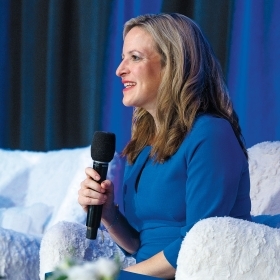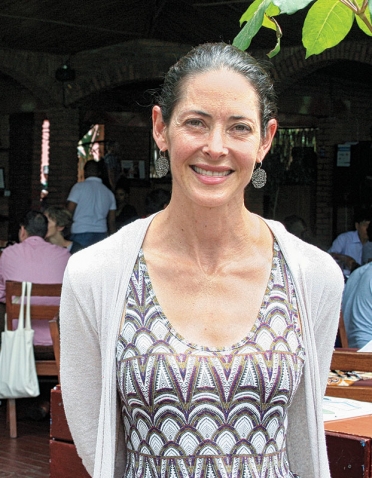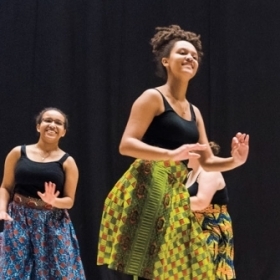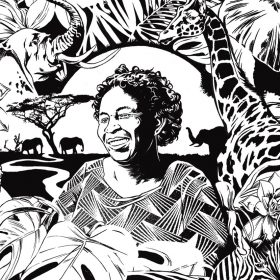Alissa Carlat Ruxin ’97 never thought she’d be a restaurateur and hotelier—much less one living in Rwanda. But in 2007, she launched Heaven, a “modern African” restaurant that has become a popular destination in Kigali, the capital.
Heaven opened as the impoverished East African country was recovering from the genocide that killed some 800,000 people. In 2006, Alissa moved to Kigali from New York, not long after marrying her husband, Josh, who got a job helping bring health services to poor villages. “We came as honeymooners and thought it would be an adventure,” says Alissa. “Our adventure turned into life.”
Since then, she also opened Heaven’s adjacent 33-room boutique hotel and this year launched a small high-end luxury hotel called The Retreat. The entire business employs more than 80 people in a country where salaried jobs are precious and still relatively few. It gives valuable opportunities and training to young people, many with limited education. Over the years, many Heaven employees have moved on to jobs at Kigali’s big luxury hotels such as Radisson and Marriott that have set up shop as the country burgeons.
Alissa mentions Solange, who started as a cleaning woman at Heaven and is one of 10 children from a poor family. Today, Solange is Heaven’s sous chef and paid her own way through university.
It’s been a surprising path for Alissa, who earned a master’s from the Harvard School of Public Health after majoring in psychology and Spanish at Wellesley. In Rwanda, she expected to find work in public health but couldn’t get a job, so she began volunteering at an orphanage with children whose families were killed in the genocide. Alissa’s original plan to start a café was thwarted when the Bourbon coffee chain broke ground. Plan B was hatched: A restaurant could create jobs—and satisfy the gourmet “foodie” tastes that Alissa and her husband missed from the U.S.
“Did I ever think I’d become an entrepreneur? No. I’m not a risk taker,” she admits. Yet part of the decision to move to Rwanda came from dissatisfaction with her previous job in New York managing corporate health-care programs. “In New York, I wouldn’t have been able to do this,” she says, as staff in neat uniforms serve customers lunching in Heaven’s leafy, porch-like dining area. On weekends, the Ruxins’ three young children—ages 6, 8, and 10—are often at the restaurant, along with the three teens they adopted after their Rwandan housekeeper died of AIDS.
Alissa confesses that at Wellesley she was not confident. However, launching and running Heaven has “completely changed me as a woman and a leader. It’s part of my identity now.”
The journey has presented plenty of challenges. When she arrived in Rwanda, Alissa knew neither French nor Kinyarwanda, the lingua franca, and had no restaurant management experience. She and her husband carried suitcases crammed with cooking equipment back to Rwanda after visiting the U.S. It was difficult to teach staff who had never eaten in a restaurant before; many of the initial employees were from the orphanage where she had volunteered.
Still, Heaven has flourished alongside a country recovering from a bloody history, that is today known for order and safety—as well as a controlling, controversial government. It’s a far cry from the precarious state Rwanda was in when Alissa arrived. “People came to our house to dig up the bones of relatives buried in our yard,” she recalls soberly. Looking back over the time she has lived in Rwanda, the “country is doing better each year, even the poorest of the poor,” Alissa says.







We ask that those who engage in Wellesley magazine's online community act with honesty, integrity, and respect. (Remember the honor code, alums?) We reserve the right to remove comments by impersonators or comments that are not civil and relevant to the subject at hand. By posting here, you are permitting Wellesley magazine to edit and republish your comment in all media. Please remember that all posts are public.